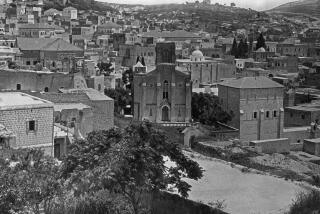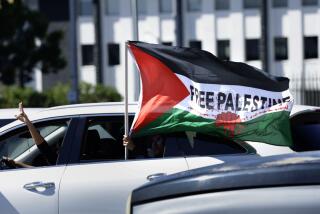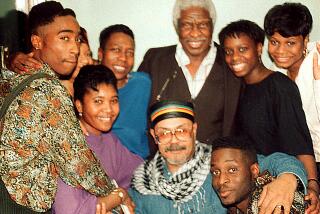Fatima Bhutto’s love-hate affair with her native Pakistan
- Share via
Fatima Bhutto wrote her book because she wanted to remember her father.
She wanted to remember his silly nicknames, his joke about putting a disco ball in her redecorated bedroom, and how he told her she was too young for lipstick. She wanted the 14 years she had with him to be written down somewhere before she started to forget. It was the last promise she made to him before his death in 1996.
“When I think of my father, I never think of him as a politician,” she said in a recent phone interview.
And yet, her father Murtaza’s life story would not be complete without examining the family he came from, the Bhuttos, a South Asian dynasty that has fueled Pakistani politics for decades. They are the subject of Bhutto’s memoir “Songs of Blood and Sword: A Daughter’s Memoir” published this month.
It is a political family that has borne the burden of power: Fatima’s grandfather, founder of the Pakistan People’s Party, was hanged. Her uncle was poisoned in France. Her father — a political activist — was gunned down by police. And in December 2007 her aunt Benazir, the first woman to serve as prime minister in an Islamic country, was assassinated by extremists after a campaign rally in Rawalpindi.
The author documents her family’s history in her memoir, which is both violent and romantic and that excavates the small things about their lives. The book is a historical walk through her late father’s life and it’s also a family history, showing how her surname and the country are tied together … how the family has been part of the turbulence of a country conflicted.
She opens her memoir by retracing her father’s last days and nights, bringing us into their historic family home, 70 Clifton in Karachi. Though the text follows a traditional timeline, we see poetry unfold inside otherwise grim scenes. At one point, she whisks us through her father’s last car ride, detailing the colors of the market, the noise, the faces he would have seen from his window. She recounts small details —her father’s evening shoeshine routine, the way he preferred cups to be arranged in a cupboard, the order of his books.
“My parents got divorced, so my father raised me since I was 7. There is no overstating what a wonderful parent he was,” she said. “We were living in exile. His father had been killed. The face of the country as he knew it had changed. And yet he managed to create this world for me — it was all bedtime stories and James Bond movies and chocolate before dinner. He insisted that we live.”
Though Bhutto recalls, almost effortlessly, her childhood with Murtaza, the more difficult research involved finding out who he was before she was born.
“I entered a world of his that I didn’t know existed,” she said.
She discovered his college thesis, and wished she could argue about it with him. She found his love letters. She uncovered his lovers, specifically a blonde-haired Greek woman — Della Roufogalis, with whom Murtaza found kinship after his divorce. Bhutto frames the pair in sexy scenes: “Murtaza often smoked Romeo y Julieta cigars, Che’s favorite brand, and slipped the red cigar bands onto Della’s fingers.”
Though this memoir is undeniably intimate, it also offers a political glimpse into a corrupt Pakistan. Government without checks and balances. Tortured bodies in bags, left on the side of dirt roads. Power and light limited by high prices and a crooked electric company.
“We are a nuclear armed state,” she laments in her memoir, “that cannot run refrigerators.”
Her Aunt Benazir served two terms as Pakistan’s prime minister, and she should be a perfect role model for Fatima, who is also interested in changing her country. Their personalities have drawn numerous family comparisons, but the author writes of their tenuous relationship. Fatima’s father and Fatima herself, she explained, favored a government of the people, while Benazir enjoyed power — their politics couldn’t be more opposite. The writer even once suspected Benazir of being involved in her father’s death and is critical of her aunt’s capacity for corruption.
Despite the politics and the past, at the moment, Pakistan is drowning and Bhutto knows it. Regarding the country’s recent, devastating flood, she talked of unnecessary strife.
“You look back and see that these dams have not been maintained, and now you have one-fifth of the country submerged,” she said. “It’s heartbreaking, not only because of its impact, but because it should have been preventable.”
As for international aid, she was surprised by the large donations raised for Haiti after its earthquake earlier this year compared to smaller amounts of relief money raised for Pakistani flood victims.
“It’s as if the world has turned its back on Pakistan,” she said.
Bhutto is a political voice, yes, but not a politician. She claims she has no intention to have a career in politics, though she has been asked about it many times. At 28, she sees her path as that of the writer, imagining, perhaps, that the pen really is mightier than the sword.
“I always wanted to be a writer,” she said. “I used to write short stories, and my father would act as if I’d split the atom.”
In a country rife with suicide bombings, corrupt police and international accusations of harboring terrorists, Bhutto still sees herself having a future and raising a family in Karachi.
“I still think of it as where I belong. Where I want to be,” she said. “It’s a frightening place though. It’s a place I associate with a lot of love and a lot of fear.”
Though she explains her mixed emotions, it seems that the love is greater than the fear.
She paraphrases Rumi, saying: “Even though I wander, my compass always points toward home.”
More to Read
The biggest entertainment stories
Get our big stories about Hollywood, film, television, music, arts, culture and more right in your inbox as soon as they publish.
You may occasionally receive promotional content from the Los Angeles Times.










